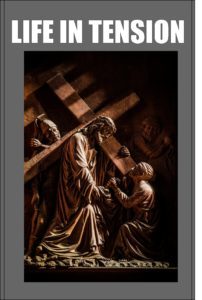Grief Defines Identity
 My Father, if it be possible,
My Father, if it be possible,
let this cup pass from me;
nevertheless, not as I will, but as you will.
(Matt 26:39)
By Stephen W. Hiemstra
The emotional tension within ourselves is never greater than when we mourn, which requires a decision: do we turn into our pain in self-pity or do we turn to God in faith? Standing in the shadow of the cross at Gethsemane, Jesus turned to God when he faced this decision.
The decisions we make and the pains we bear shape our identity because they are both unavoidable and costly—we do not normally choose to experience pain. Pain and grief transform us and the only emotion that appears in the Beatitudes is grief.
We grieve when we lose something important. In writing about the second Beatitude, Evangelist Billy Graham (1955, 20–26) identified five objects of mourning:
Inadequacy—before you can grow strong, you must recognize your own weakness
Repentance—before you can ask for forgiveness, you must recognize your sin;
Love—our compassion for suffering of brothers and sisters takes the form of mourning and measures our response to Christ’s commandment to love God and love our neighbor,
Soul travail—groaning for the salvation of the lost; and
Bereavement—mourning over those that have passed away.
These objects of grief can also be categorized functionally, as:
Material loss;
Relationship loss;
Intra-psychic loss—loss of a dream;
Functional loss—including loss of autonomy;
Role loss—like retirement; and
Systemic loss—like departure from your family of origin (Mitchell and Anderson 1983, 36–45).
Each loss is unique and must be separately grieved which takes time and energy. When we neglect to take the time to grieve our losses, the grief does not magically disappear; it can come back in the form of sudden outbreaks of anxiety or depression without obvious explanation—emotional hijackings. We try to avoid grief because it reminds us of our mortality and, in doing so, frequently challenges the flawed assumptions that we prefer to live by.
Loss and grief were not always ignored, as my grandfather taught me when my grandmother suffered from Alzheimer’s disease. In spite of being over one hundred years old, my grandfather expressed his love by caring for her at home and set an example of sacrificial love and faithfulness that I will never forget.
Saint Francis of Assisi said it best:
Lord, grant that I may seek rather
To comfort than to be comforted,
To understand than to be understood,
To love than to be loved; For it is by giving that one receives,
It is by self-forgetting that one finds,
It is by forgiving that one is forgiven,
It is by dying that one awakens to eternal life (Graham 1955, 24).
The griefs we bear and the choices we make strengthen our faith, define our character, and temper our relationships, working in us like the refiner’s fire (Mal 3:3).
Jesus teaches: “Honored are those who mourn, for they shall be comforted.” (Matt 5:4)
References
Bonhoeffer, Dietrich. 1995. The Cost of Discipleship (Orig. pub. 1937). New York: Simon and Schuster.
Graham, Billy. 1955. The Secret of Happiness. Garden City, NY: Doubleday and Company, Inc.
Mitchell, Kenneth R. and Herbert Anderson. 1983. All Our Losses; All Our Griefs: Resources for Pastoral Care. Louisville: Westminster John Knox Press.
Nouwen, Henri J.M. 2010. Wounded Healer: Ministry in Contemporary Society (Orig pub 1972). New York: Image Doubleday.
Grief Defines Identity
Also see:
Preface to a Life in Tension
Other ways to engage online:
Author site: http://www.StephenWHiemstra.net
Publisher site: http://www.T2Pneuma.com
Newsletter: https://bit.ly/Meet_2020
The post Grief Defines Identity appeared first on T2Pneuma.net.



